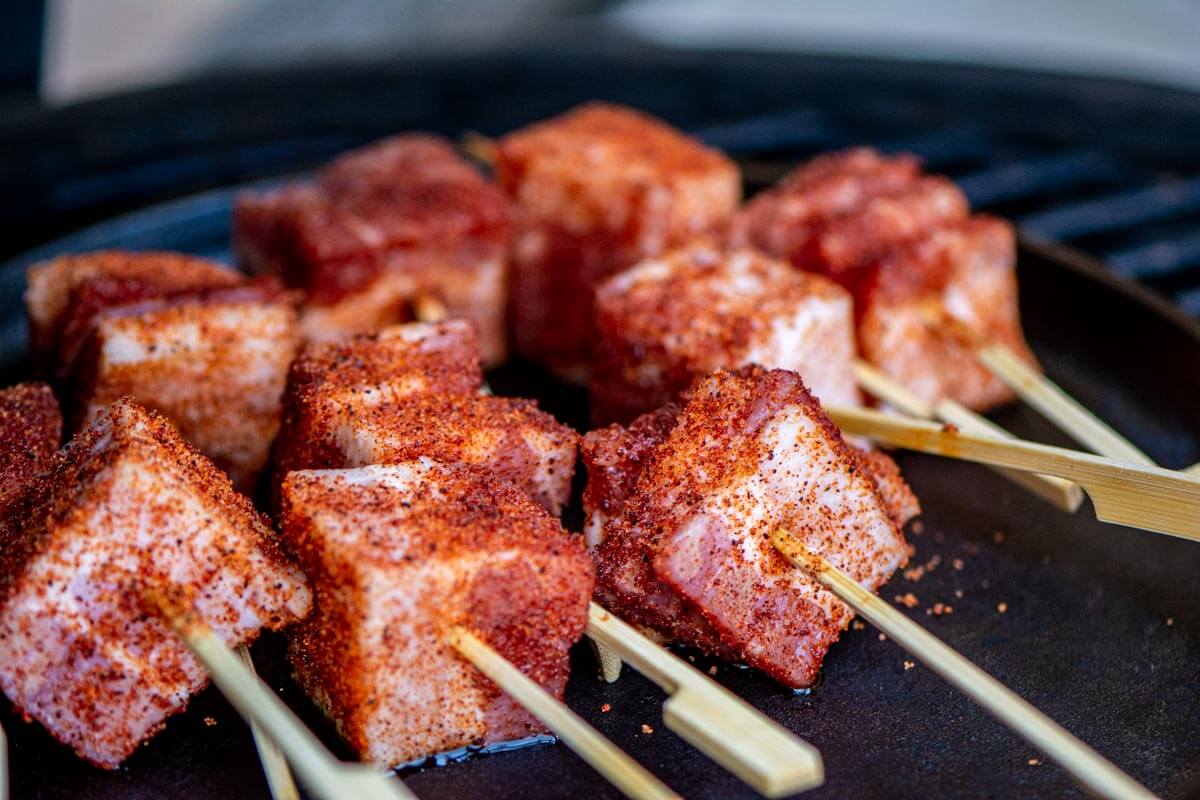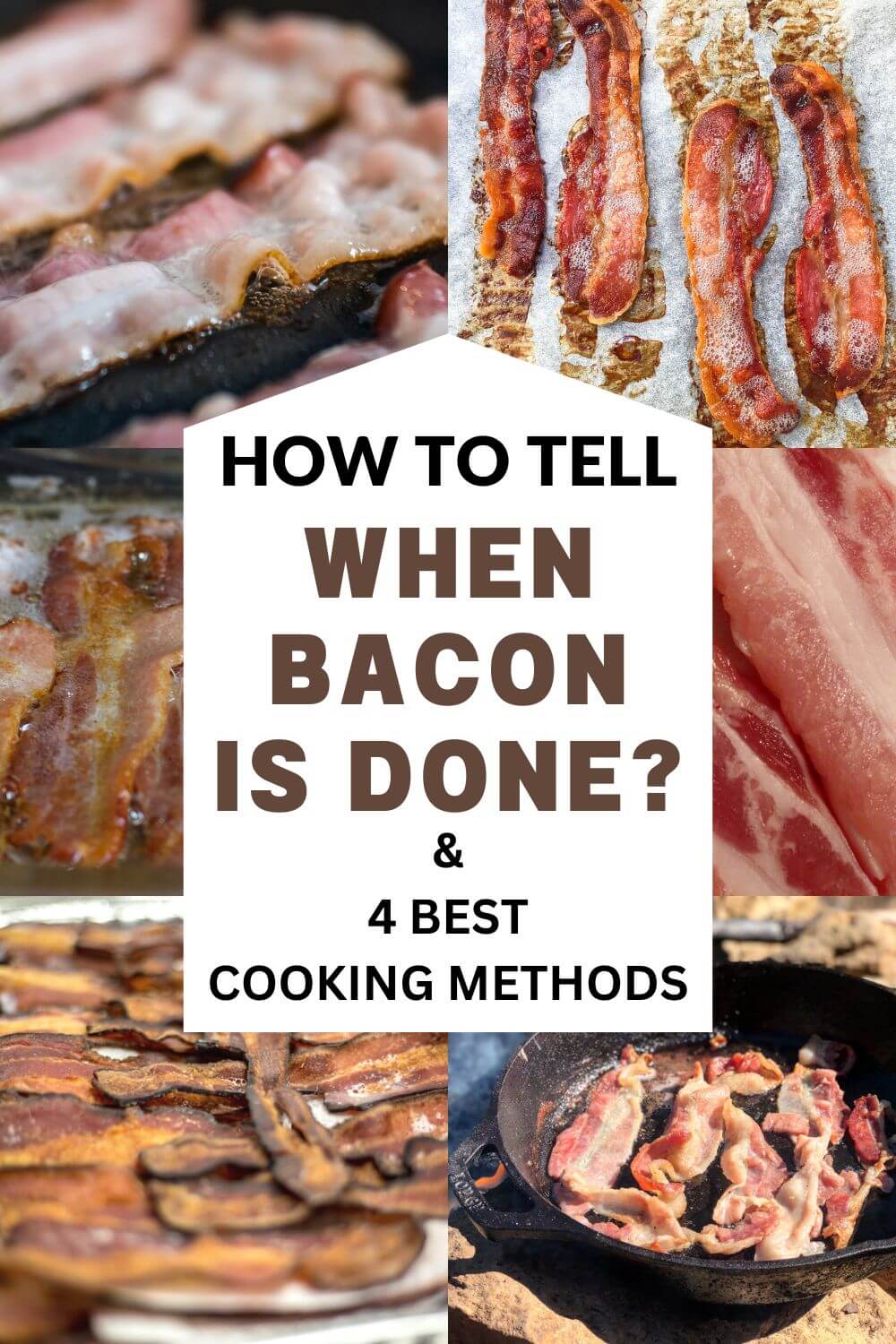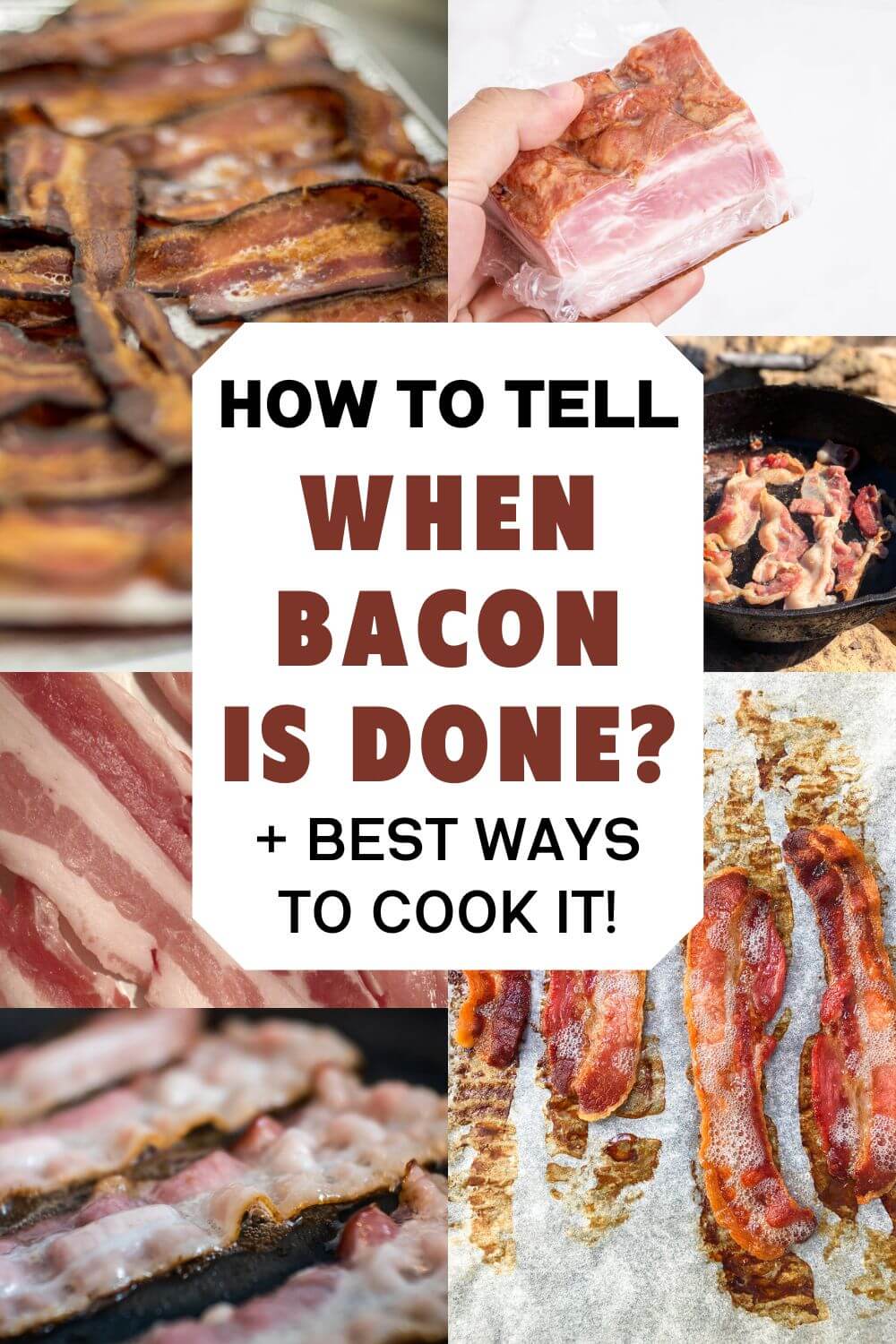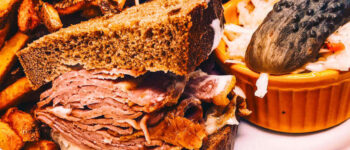Bacon’s yum factor largely depends on how it’s cooked. Whether you enjoy a bit of chew in your bacon, or you’re dreaming of sinking your teeth in brittle crispiness, you might be curious how to tell when bacon is done. It’s really easy, and there are many ways to cook it with mouthwatering results every time!
Bacon is a breakfast staple and used in an impressive number of recipes, from burgers and sliders to casseroles, oven dishes, and even as a topping in salads.
In most cases, you can tell when bacon is cooked by simply relying on your senses, although a meat thermometer can be useful for extremely thick slices. Look for an internal temperature of 148°F per USDA.
🥓 What Is Bacon?
Bacon is typically made from raw pork belly that is cured and smoked. It is easy to make, and we have detailed home cured bacon instructions if you want to give it a shot. Curing bacon is a lot simpler than you would think and addicting to try out different flavors.
You can usually find it cut in slices or cubes, although slab bacon, which is the whole pork belly cut, is available in some grocery stores and butcher shops.
The latter gives you the advantage of cutting it into whatever thickness or shape you need. To do that, you’ll want a good quality meat slicer and we have several recommendations on which meat slicers are best for the home.
Now that you know the difference between pork belly and bacon, let’s see the easiest ways to tell when bacon is done, and the most popular methods to cook it.
🔍 How To Tell When Bacon Is Done? Key Factors To Consider
As delicious as they may be, these popular strips of cured meat can be over or undercooked. When cooked for too long, they can easily burn and taste like charcoal.
If the cooking time is too short, bacon is not safe to eat. This is not true for most cured pork products, bacon is the exception as it can harbor bacteria.
The only way to destroy the bacteria and make it safe to eat is to expose it to high temperatures. And let’s be honest: raw bacon doesn’t look or taste appetizing at all!
Color
Being made from pork belly, raw bacon has alternating layers of meat and fat. The meaty parts have a light pink color, while the fat portions are white.
When exposed to heat, bacon changes color from light pink to light brown that gradually darkens and gets a reddish hue.
As soon as bacon’s meat layers turn brown, you can consider it fully cooked. The cooking process can be continued until the bacon slices reach the level of crispiness you desire.
A deep reddish brown color is a good indicator that your bacon is both cooked and crispy. When that happens, the fat will also have changed its color, having a yellow hue.
Of course, if your bacon becomes dark brown or black, it means you overcooked it and it might taste bitter. I know some folks like it super well done, but it is a bit much for me.
Texture
Those who like their bacon crispy don’t have to ask themselves if it was cooked long enough. If it is crispy, it is done.
Things are a bit trickier if you like your bacon with a bit of chewiness.
Even in this case, the meat should still be at least slightly crispy. When you lift a strip of freshly cooked bacon, it should not be be overly droopy, and it needs to feel light.
Tip: Touching hot bacon with your fingers to check the texture is not a good idea! You can safely do this test using the back of the spoon.
Also, be sure to check it often when it’s close to being done. If you don’t pay attention, those last minutes can take your bacon from perfect to charred.
Moisture
Raw bacon feels greasy to the touch, thanks to all those layers of fat. It also contains a lot of water, most of which evaporates during cooking.
Note: If you cook store-bought bacon, it is safe to assume it was cured in a water bath. This adds a lot of moisture to the slices and is why bacon splatters while cooking it. If you cure it at home, you’ll notice it won’t splatter as much.
Unless you add water or another liquid when cooking bacon, when it’s done, it should be light and hold its shape after it cools slightly.
Cooked bacon, drained on paper towels, will feel almost dry to the touch.
Shape
Raw meat will shrink during cooking, and bacon makes no exception. In fact, it can shrink up to 40%.
See more : Dirty Chai Latte Starbucks | A Spicy and Creamy Delight
The shape of bacon is an indicator of its doneness level you should pay attention to. When raw, bacon slices will lay flat and they will begin to curl as they cook.
As it takes this wavy shape, some parts of the slice will lift, not touching the hot surface.
Flipping your bacon halfway through the cooking process is the best way to make sure it heats evenly, and all bacteria are killed.
Tip: My favorite cooking technique is on a sheet pan with a raised baking grid, and that eliminates the need to turn them half way.
Grease Level
During cooking, a lot of the grease naturally present in bacon will render out. An obvious clue is white foam forming around each strip.
When you see foam, it’s time to flip your bacon. At some point, the foam will gradually dissipate, and that is a good hint your bacon is fully cooked.
Thick Bacon Slices
For bacon slices that are over ½” thick, the best way to tell if they are cooked is to use an instant-read thermometer. The minimum safe temperature for bacon is 145°F.
For an accurate reading, insert the thermometer from the side until it reaches the center of the slice.
🔥 Best Way To Cook Bacon (4 Options)
If there’s one thing about bacon that’s true, is it’s always delicious, no matter how you cook it. We’ll show you our favorite techniques – they work great!
Choosing one depends on your available appliances and time constraints. We love a good crispy bacon on top of our Smoked Mac and Cheese.
🍳 On The Stovetop
Cooking bacon on the stovetop lets you watch it and figure out when it reaches the doneness you’re looking for. Of course, this means you can’t leave it unattended. Be ready for some grease splatter though. If you use this technique, use a splatter guard for the pan. It won’t eliminate the splatter, but it will cut it down significantly!
Turkey bacon cooks up perfectly on the stove top.
Deep Frying
Step One: Pour a generous amount of oil into a frying pan.
Step Two: Turn on the heat on medium-high and allow the oil to get hot.
Step Three: Add the bacon strips and flip them several times for 2-4 minutes until they become golden brown or they reach the texture you want.
Step Four: Allow the bacon slices to drain on paper towels before serving.
Pan Frying
Step One: Lay the bacon slices in a cold skillet. Add them in just one layer and make sure they don’t overlap. I will typically add a dollop of bacon grease to help the first batch not stick.
Step Two: Turn on the burner at medium-high heat.
Step Three: Using tongs, flip the slices every few minutes until they reach your preferred doneness.
The entire process can take between 7 and 12 minutes, depending on how thick your bacon slices are.
Step Four: Remove the bacon and drain it on paper towels for 1-2 minutes before serving.
In The Oven
This is my preferred technique as it is easy, doesn’t require close monitoring, and cleanup is much quicker. Lower fat turkey bacon does well in the oven just like regular bacon Remember it won’t get super crispy as it’s lacking the fat content. Test doneness at 15 minutes.
Step One: Preheat the oven to 375°F (190°C).
Step Two: Place the bacon strips on a raised wire rack in a single layer with no overlaps.
Step Three: Add a piece of parchment paper to a sheet pan and set the rack on the lined sheet pan to catch grease drippings.
See more : Water Weight Calculator
Step Four: Place the pan in the oven.
Step Five: Depending on the thickness of your bacon slices, the total cooking time will be different. Consult the chart below.
Once the bacon is cooked to your liking, place the slices on paper towels and let them soak up the last bit of grease for a few minutes.
Note: If you choose to bake on a sheet pan instead of a cooling rack, the cooking times will be a few minutes shorter and your bacon will be slightly chewy. It’s better to use the wire rack so the grease drips into the pan.
On The Grill
Cook thin bacon slices on the grill in a cast iron skillet. They can burn really fast if placed directly on the grill grates. It will take approximately 7-8 minutes for your bacon strips to be perfectly cooked.
For grilling regular-cut or thick bacon slices, preheat your grill to moderate heat (325°F/162°C), leaving at least one burner off to create an indirect heat zone.
Step One: Oil the grates using a high smoke point cooking oil, such as canola oil.
Step Two: Place the strips of bacon in the indirect heat zone, perpendicular to the grates lines.
Step Three: If using a gas grill, reduce the heat to medium-low.
Step Four: Flip the bacon several times until it’s done to your liking.
Step Five: Drain on paper towels for a few minutes before serving to get rid of the excess grease.
Quick and easy ways to put out your charcoal grill.
In The Air Fryer
The Air Fryer will give you the crispiest bacon ever, with no need to add extra fat or oil the Air Fryer basket.
If crispiness is what you’re after, this is the best method for cooking bacon. Still, you can use a shorter cooking time if you want your bacon to have a slightly softer texture.
Preheating is not needed to cook bacon in the Air Fryer, even if some models recommend it.
Step One: Lay the bacon strips in the Air Fryer basket in a single layer without overlaps.
Step Two: Air fry bacon at 350˚F degrees Fahrenheit (176˚C). For regular cut bacon, air fry for 7 minutes if you want it softer, or 8-9 minutes if you prefer it crispy. Air frying thick-cut bacon for 9-10 minutes if you want it slightly chewy, or 10-12 minutes to make it crispy. Remove with tongs or fork. Be careful to not touch the edges of the fryer.
Other Techniques
Don’t think those are the only way to cook bacon.
We made Grilled Bacon on a Stick that is very easy and kids LOVE over a nice medium-hot fire! The flavor changes based on what seasoning you choose to sprinkle on the sticks.

Grilled Twisted Bacon is another favorite of the family. Mix up the seasonings and turn this into a sweet and spicy breakfast treat.
Of course, we use it to wrap lots of other foods, because who doesn’t LOVE bacon? Bacon Wrapped Tater Tots, Chicken Bites, Pork Tenderloin, and Chicken Livers. Heck, I need to figure out how to make bacon-wrapped BACON next! 😊
Can You Eat Bacon Raw?
No. While bacon is a cured meat, it still requires cooking to address the risks of food borne illness.
FAQ
Final Words
Cooking the perfect bacon is pretty easy to achieve if you’re willing to monitor it closely. The thinner the slices, the more careful and involved you need to be, since these can burn incredibly fast.
Now that you have all the facts, you should be able to tell when bacon is done regardless of the cooking method you choose. Enjoy!


Nigel Gildon editor:Nigel Gildon is the editor of Chef Wayne’s Big Mamou: Chef Wayne’s Big Mamou. He has worked in the publishing industry for many years and has a passion for helping new authors get their work into the hands of readers. 63 Liberty Street * Springfield, MA 01003






